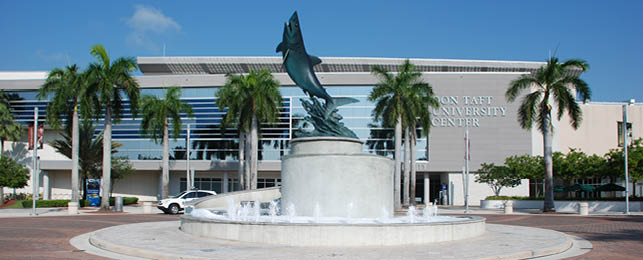Confidentiality and Privacy
NSU recognizes that students, employees, and others who have experienced sexual misconduct, especially acts of sexual violence, are concerned about the confidentiality and privacy of information relating to an incident of sexual misconduct. Once the university is aware of an incident, information is only shared with those who have a “need to know” the information in order to assist with the university’s management or resolution of the incident.
While the university encourages reporting of all crimes and acts of misconduct so that they can be addressed, a victim has the right to remain anonymous. Victims and third-parties should be aware that most NSU employees are designated “responsible employees” under Title IX, which means they are required to report information related to incidents of sexual misconduct that is shared with them so that the university can respond appropriately and promote a safe campus. However, as the university recognizes that the health and well-being of a victim is a top priority, there are several employees designated as confidential resources, and some others that only have to report some general information about an incident (not a victim’s name). These individuals can assist a victim in getting medical and other care.
If a student or any person is unsure of an employee’s reporting requirements, they are encouraged to ask the employee prior to sharing any information. While all efforts are made to protect the confidentiality of a victim, victims should be aware that, for those situations where the university determines that there is a serious and immediate threat to the safety of the university community, a timely warning may be issued to the campus community. Such a warning will not include any identifiable information about victim(s).
Below is a summary of the employees and resources who maintain full confidentiality within the confines of law, as well as some who can maintain anonymity of a victim, while still reporting general information to the university.
Confidential Resources
Confidential resources maintain the highest level of confidentiality of the information that a victim may share with them. Reasons why a victim might seek these people out include
- to process what happened with a person who has legal obligations to maintain confidentiality;
- to obtain supportive services such as victim advocacy; legal services; or services such as medical/health, mental health, or disability; and
- to assist a victim in determining whether to file a formal report with the university, law enforcement, or both
Sharing information with these resources does not initiate a formal investigation, disciplinary action, provision of academic services, adjustments to living arrangements, or other accommodations or remedies from NSU. Even if a victim initially requests confidentiality, the victim may later file a complaint with the university or report the incident to the police, and thus have the incident fully investigated.
Professional, licensed counselors and pastoral counselors who provide mental health counseling to members of the school community (including those who act in that role under the supervision of a licensed counselor) are not required to report any information about an incident to the university, not even to the Title IX Coordinator, without a victim’s permission. The following is contact information for these individuals:
Henderson Student Counseling Center
University Park Plaza
3440 South University Drive
Davie, Florida 33328-2003
Tel: (954) 424-6911 or (954) 262-7050
Fax: (954) 424-6915
(available 24 hours a day, 7 days per week)
Counselor-in-Residence
Office of Residential Life and Housing
3301 College Avenue
Fort Lauderdale, Florida 33314-7796
Tel: (954) 262-7052 or 800-541-6682, ext. 27052
Health Care Professionals
NSU Student Medical Center
3200 South University Drive
Fort Lauderdale, Florida 33328-2018
Tel: (954) 262-1262
NSU Psychology Services Center
Maltz Psychology Building
3301 College Avenue
Fort Lauderdale, Florida 33314-7796
Tel: (954) NSU-CARE (678-2273)
Exceptions to Confidentiality
There are three key exceptions involving specific circumstances that require the confidential resources to
report information.
- Any physician, nurse, or employee thereof, and any employee of a hospital, sanatorium, clinic, or nursing home knowingly treating any person suffering from a gunshot wound or life-threatening injury indicating an act of violence, or receiving a request for treatment, must report the same immediately to the local police.
- All of the confidential professionals (physicians, psychotherapists, professional counselors, clergy, and sexual assault and domestic violence counselors and advocates) are mandatory child abuse and neglect reporters and are required to report incidents involving victims under 18 years of age to the Florida Department of Children and Families.
- Some or all of these professionals may also have reporting obligations under Florida law to (1) local law enforcement, in cases involving threats of immediate or imminent harm to self or others, where disclosure of the information is necessary to prevent the threatened danger; or (2) to the court, if compelled by court order or subpoena in a criminal proceeding related to the sexual violence incident.
Employees Who Can Maintain Privacy of Identity
In addition to the confidential resources described above, there is a second group of NSU employees who, while they cannot maintain complete confidentiality under the law, can maintain a high level of privacy of a victim’s identity. These designated individuals are only required to report some general information about an act of sexual violence that is reported to them, or that they learn about in the course of their job. The information that they have to report (if known) consists of the nature of the incident, the general on-campus location (for inclusion in the annual Clery Report) or if it occurred off-campus, and when it occurred. They do not have to report a victim’s name, the name of the individual(s) who may have committed the act, and/or any other information that might give away the identity of the victim.
NSU employees in this category include nonprofessional counselors and advocates, as well as individuals working or volunteering in the NSU Student Medical Center on the Fort Lauderdale/Davie Campus, including those working at the front desk.
Anonymous Reports
The Title IX/Sexual Misconduct Incident Reporting Form allows for anonymous reports of sexual misconduct. All anonymous reports will be reviewed by the Title IX Coordinator for university response.
If a victim of sexual violence or a reporting party shares information with a responsible employee, but wishes to remain anonymous, the responsible employee must still report any known information about the identity of the victim/reporting party and the person reported to have engaged in sexual misconduct to the Title IX Coordinator. The Title IX Coordinator will evaluate requests for anonymity/confidentiality in accordance with the procedures in this policy. The reason for this is that NSU has an obligation to ensure that all victims of sexual violence who share information with a responsible employee receive information about their rights and options. While the university will ensure that information about support and reporting options are provided to a victim whose identity is known to the university through a responsible employee, final decisions about the use of such resources are voluntary for victims unless they are too seriously injured to make their own decisions.
Anonymous reports will be included in the annual crime statistics when enough information (such as location, date, and nature of incident) is known, and may also be cause to issue a timely warning to the campus if there appears to be a serious and immediate threat.
Evaluating Requests for Anonymity, Confidentiality and/or for No Action to Occur
If a victim discloses an incident to an NSU employee who is not a confidential resource or cannot maintain privacy of the victim’s identity, as described above, and the victim wishes not to have his/her/their identity known to others, and/or requests that no investigation or action occur, the university must weigh that request against the university’s obligation to provide a safe, nondiscriminatory environment for all students, including the victim. For this reason, victims or reporting parties who seek confidentiality should seek out confidential resources. However, the university sometimes learns about incidents from a third party or from a victim who is not aware of the reporting requirements that an NSU employee may have. In addition, a victim may report an incident, but request that no investigation or formal action occur by the institution, or may decide at a later date not to participate in the investigation or resolution process. In situations where a victim makes such a request, Laura Bennett, NSU’s Title IX Coordinator, will evaluate whether the university can honor the request using a range of factors. These include:
- any reasonably anticipated risk that the reported individual will commit additional acts of sexual or other violence, based on factors such as
-
- whether there have been other sexual violence complaints about the same reported individual,
- whether the reported individual has a history of arrests and/or records from a prior school indicating a history of violence, and
- whether the reported individual threatened further sexual violence or other violence against the victim or others;
-
- whether the sexual violence was committed by multiple individuals;
- whether the sexual violence was perpetrated with a weapon;
- whether the victim is a minor;
- whether the university possesses other means to obtain relevant evidence of the sexual violence (e.g., security cameras or personnel, physical evidence);
- whether the victim’s report reveals a pattern of misconduct at a given location and/or by a particular group
The presence of one or more of these factors could lead the university to investigate and, if appropriate, pursue disciplinary action.
If the university honors the request by a victim, the victim must understand that the university’s ability to meaningfully investigate the incident and pursue disciplinary action against the reported perpetrator may be limited. If the university determines that it cannot comply with a victim’s request, the university will inform the victim of this prior to starting an investigation and will also inform the victim of the college officials who will receive information in their role of handling the university’s response. The Title IX coordinator will determine those individuals responsible for handling the university’s response, in accordance with these procedures.
In all cases, but especially when a victim requests confidentiality/anonymity and/or no action, the university will remain ever mindful of the victim’s well-being and will take ongoing steps to protect the victim from retaliation or harm and work with the victim to create a safety plan. Retaliation against the victim, whether by students or university employees, will not be tolerated. The university will also provide the victim with all the rights and options available, regardless of whether the victim chooses to remain anonymous or not.
Because the university is under a continuing obligation to address the issue of sexual violence campus-wide, reports of sexual violence (including reports that do not identify a victim and/or a specific perpetrator) will also prompt the university to consider broader remedial action— such as increased monitoring, supervision, or security at locations where the reported sexual violence occurred; increasing education and prevention efforts, including to targeted population groups; conducting climate assessments/victimization surveys; and/or revisiting its policies and practices.


